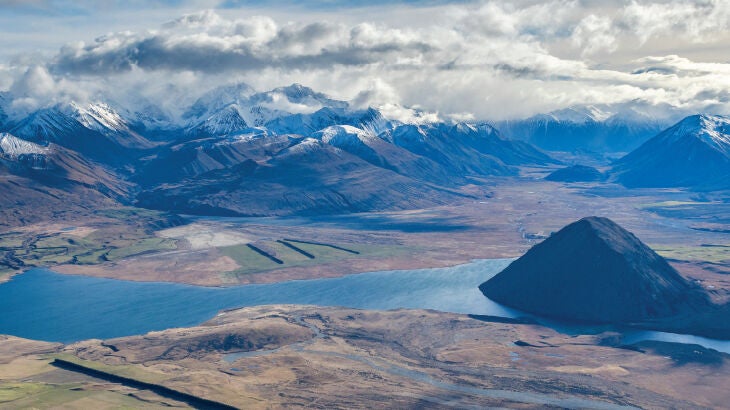Country -
High country

In an increasingly urbanised world, the draw of this wide-open landscape has not diminished, and if anything – it’s grown stronger.
Station owners operating in a dynamic, ever-changing landscape have been compelled over the years to reassess and adjust how they run their expansive properties to remain viable, amid climate change challenges, government regulations and shifts in expectations on how the high country is looked after.
For John and Rose Acland of Mount Peel station up the Rangitata Gorge in Canterbury, there are four generations before them who have faced the challenges the high country brings. For John, his family and staff, the focus of this generation is to run a grass-based sustainable expansive operation that will see the station well into the next five generations.
The station stretches for 20km up the Rangitata Gorge with the river a natural boundary for country that graduates from the foothills to 1,500m above sea level at its highest point.
The spread of altitude and a generous 1,700ha of flats along with 2,500ha of grazable hill country gives Mount Peel the ability to be a focused, commercial stock operation that encompasses sheep, beef, and venison. That good balance of flat land is also enhanced with a regular 1,200mm of annual rainfall, making it ideal for both breeding and finishing.
Family investment in a dairy unit on the flat country near Mayfield also matches well with the station, where the dairy unit’s calves are wintered. The dairy farm also provides a source for the 400 Friesian bulls the station runs, a stock class that provides a level of flexibility when it comes to quitting animals depending on feed levels.
Their weight gains have been enhanced in recent years, thanks to the use of sexed semen in the dairy herd and use of Charolais genetics which has allowed the use of more beef genetics.
The station’s location and spread means it can run Romneys, with 9,500 Romney cross ewes and 3,000 replacement hoggets with the cross coming from Suffolk and Beltex, a heavily muscled Texel offshoot.
He says the station’s mix of ‘a third, a third, a third’ across the three livestock classes has held up well over the years, but he’s not averse to re-examining the mix as markets shift. “I guess having been here for 150 years and weathering the many ups and downs, you do learn to move with the times and get smarter in how you adapt to the challenges we get,” he says.
Deer are the third livestock type Mount Peel runs and fit well on the station’s summer-safe country.
“We run the hinds on the hills which are summer-moist country, the grass doesn’t start growing until well into October, so the deer fit in well here.”
The Aclands have been heartened by the reversal in fortunes the venison sector has started to experience post-Covid, when the global pandemic hit the sector hard shutting down restaurants and hotels that were a key market for the high-value red meat.
“We are seeing the schedule come back to nearer $9/kg, this is closer to where it needs to be, even if it’s still off its high of $11/kg,” says John.
Over 1,300 velveting stags also contribute to Mount Peel’s stock income, with the South Korean velvet market proving to be a solid performer as New Zealand’s reputation as a quality supplier has grown over the years.
The family has enjoyed a strong relationship over the past 35 years with the same family-operated business that has bought Mount Peel velvet consistently over that time.
At the heart of Mount Peel’s commercial operations is a focus on grass-fed protein production, and this is underpinned by a gentle environmental footprint with the family working hard to maintain and build the station’s sustainability.
The station has 300ha of regenerating native bush, and a further 250ha of plantation forestry that offers the opportunity to offset the station’s carbon emissions and qualify for New Zealand’s emissions trading scheme (ETS) carbon credits.
With its generous flat country, minimal soil disturbance is assured with low till technology to help build organic and carbon levels and to minimise topsoil loss in the frequently strong nor’westers that blow through the Rangitata Gorge.
The family has also invested heavily in water trough systems to minimise incursion by stock into waterways and has fenced off over 20km of waterways, incorporating an extensive planting of deciduous and native trees throughout the property.
The station’s natural beauty also incorporates some of the South Island’s most valued historic buildings. These include the Church of the Holy Innocents, and the station’s main homestead, an elegant English-designed manor.
With one eye on overseas market trends, and another on stepping lightly in the hill country, the Aclands are confident Mount Peel is well positioned to remain the iconic, viable, high-country business it has been for at least another 150 years.
“It is the same for us as it is for most farming businesses, it’s a case of keeping your chin up and costs down. We have seen plenty of cycles before and we need to remain resilient to ride them out,” says John.
Read more...